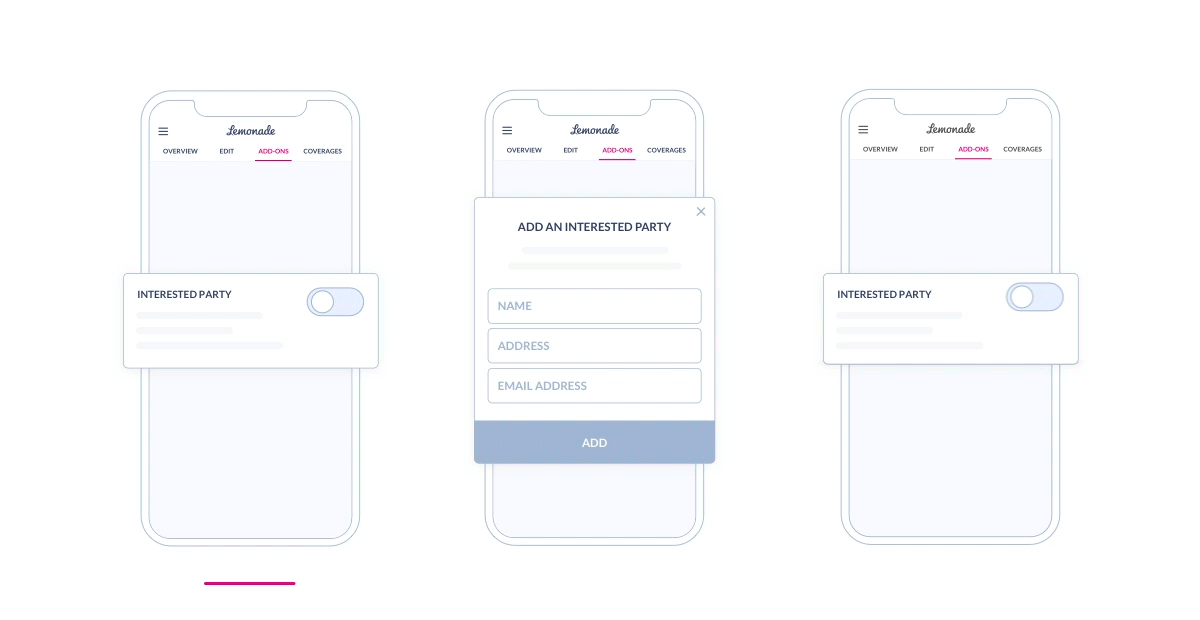An interested party on a renters insurance policy is a third party, typically your landlord or property management company, that gets up-to-date info any time you change or cancel your policy. While they’re in-the-know about your renters policy, the interested party doesn’t receive any extra insurance coverage with this title.
What is an interested party in renters insurance?
First, it’s important to note that the term has a couple names. Any time you see the words “party of interest” or “additional interest,” know that your insurer is talking about the same thing: the interested party. All of that confusion aside, an interested party is really just a person or group (like your landlord, their outside manager, or a property management company) that gets an update whenever you cancel, renew, or make changes to your policy.
If your landlord requires renters insurance, there’s a pretty good chance they want to be listed as an interested party on your policy. Why? Whoever owns your rental property wants to make a couple things about renters insurance clear to you, and needs to know what’s up with your policy in return.
First, they’re not responsible for any of your personal property damage (think stolen or destroyed laptops, couches, clothes, etc.). But mainly, if you end up cancelling your policy, your landlord wants that non-renewal notice (a perk of being an interested party).
Why? As their tenant, cancelling your policy means you no longer have liability coverage (which means protection for your landlord if a friend gets hurt in your apartment or if you accidentally set the place ablaze in a cooking experiment gone wrong). These are all things your renters insurance covers, for the most part. That’s why your landlord is interested in your coverage and needs to be flagged if you make any changes to your policy.
Now you’re probably wondering… if I list my landlord as an interested party, does that mean my premium will go up? Nope! Don’t think of it as adding extra people to your coverage and racking up your costs in the process (which you aren’t!). Think of it as just providing some proof of insurance, keeping your landlord in the loop regarding any changes to your policy.
The difference between additional interest and additional insured
Additional insured is another term you may hear tossed around in your policy. While ‘additional interest’ and ‘additional insured’ sound deceivingly alike, their similarities all but end there.
Don’t stress out: ‘Additional interest’ is just another way of saying ‘interested party.’ The phrase usually refers to landlords, property managers, or property owners—really anyone that should not fall under your coverage but should definitely be in-the-know about it.
Additional insured, on the other hand, is generally reserved for live-in significant others. This comes at a cost though. Insuring extra peeps with one policy under the title “additional insured” means paying a higher premium for that coverage.
Additional interests (or interested parties) are basically just extra addresses getting your non-renewal updates via email or snail mail—not additional people your policy would cover if a fire or other accident were to strike. That’s why your insurance agency really shouldn’t be charging you any extra costs to list an additional interest or interested party on your policy.
How to add an interested party to renters insurance
After you get your policy, adding an interested party is usually pretty simple. Exactly what you have to do differs between insurers, so it’s important to check out your provider’s FAQs and instructions before diving in.
Some renters insurance companies will let you do so online while others may make you phone in or even send a fax to get your interested parties all listed out. At Lemonade, you can add your interested party(ies) in just seconds on our mobile app with the tap of a finger by locating the “add interested party/landlord” icon on the homepage of your renters policy. Boom!
P.S you can also head over to Lemonade.com and sign into your account to do this.

When adding an interested party to your policy, you’ll typically need to include both the party’s name and the address for your apartment, leasing office, landlord, or your landlord’s management company in order for them to get any updates about your account or policy.
Adding an interested party should not increase your premium and rarely comes with a fee. It’s worth asking some questions and rethinking your insurer if you find a monthly charge for doing so; this would never be the case at Lemonade.
A few quick words, because we <3 our lawyers: This post is general in nature, and any statement in it doesn’t alter the terms, conditions, exclusions, or limitations of policies issued by Lemonade, which differ according to your state of residence. You’re encouraged to discuss your specific circumstances with your own professional advisors. The purpose of this post is merely to provide you with info and insights you can use to make such discussions more productive! Naturally, all comments by, or references to, third parties represent their own views, and Lemonade assumes no responsibility for them. Coverage and discounts may not be available in all states.




